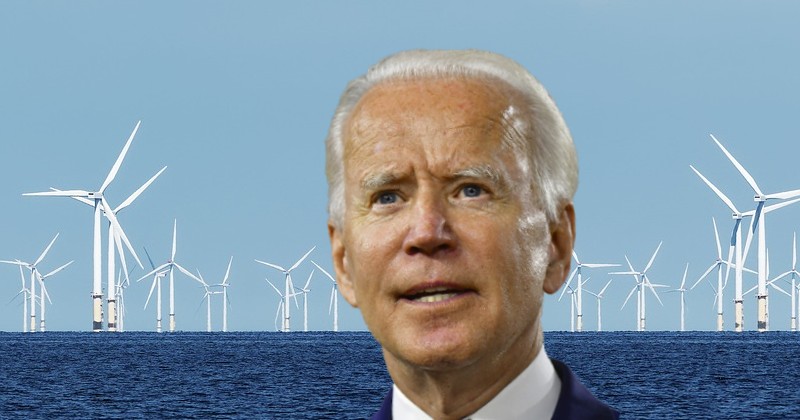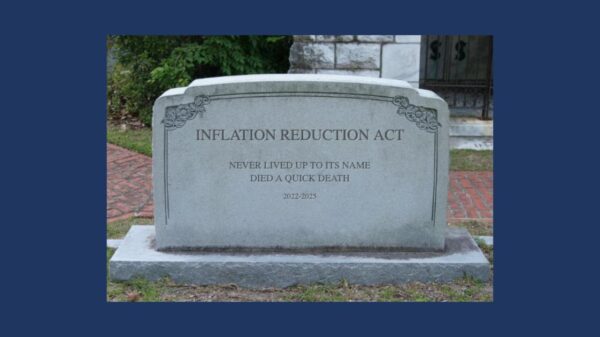By David B. McGarry
President Joe Biden has hailed his signature subsidization of clean energy as “historic.” According to a new report from the Congressional Budget Office (CBO), Biden’s investments (read: taxpayer subsidies) are proving far larger than even the President knew. The CBO now says the Inflation Reduction Act’s (IRA) clean-energy tax credits will cost $428 billion more over a decade than it previously estimated.
Analysts have warned that the IRA’s true price tag would dwarf initial estimates. A 2023 report from Goldman Sachs pegged the law’s total clean-energy costs at $1.2 trillion — more than triple CBO’s originally projected $391 billion. Worse still, this profligacy will do little for the environment since EVs’ benefits remain difficult to measure and likely negligible. In short, the IRA’s clean-energy “investments” foist massive costs on taxpayers — particularly objectionable as the National Debt speeds towards $35 trillion — yet they offer no discernable benefits.
The economic dynamics causing these overruns are simple. Government subsidies that lower a good or service’s price invariably increase consumers’ demand for it. Consider a simple hypothetical. If a grocery store were to sell quality beef at $40 per pound, only certain subset of well-to-do shoppers would buy it regularly. Were the government to subsidize these steaks and cut their consumer price in half, many more shoppers would consider it a financially viable dinner option. In economic terms, demand would rise sharply — perhaps doubling. The store’s pre-subsidy stock (20 lbs. per week, say) would suddenly become insufficient; the grocer would order and sell more beef to meet its customers’ subsidy-heightened demand.
If government planners appropriated only enough funds to subsidize the status-quo-ante 20 lbs. per week (a projected weekly cost of $400, in this scenario), they would soon discover that the beef boondoggle had run overbudget. Doubled demand for state-sponsored sirloin will have doubled the taxpayers’ burden.
Sure enough, the CBO “now expect[s] greater investment in the manufacturing of batteries and in wind and solar power generation than was anticipated in August 2022.” Subsidies — of green-energy infrastructure, in this case —produce more of the subsidized thing. The economic incentive structure is ineluctable.
When drafting legislation, political incentives drive politicians to underestimate proposals’ costs and overestimate their revenue potential. This minimizes the nasty challenges responsible budgeting poses. Further, economic models that neglect to incorporate human behavioral patterns make conveniently deceptive tools for spendthrift politicians to pitch new spending to their constituents.
The CBO notes that, of the projected IRA cost overruns, $224 billion come from EV tax credits. This stems largely from the Biden administration’s pro-EV regulation. For example, the CBO reports that the Biden administration, to widen access to EV tax credits, has loosened eligibility criteria, which increases the number of credits doled out and the public cost.
The CBO also notes that the Biden administration’s regulatory crusade against gas-powered vehicles will drive manufacturers to produce more EVs. The Environmental Protection Agency “proposed more stringent vehicle emissions standards that would begin with the 2027 model year,” the CBO reports. Should subsidization prove insufficient to actualize a national EV transition, the Biden administration intends simply to disallow manufacturers to sell gas-powered cars. The EPA proposed to mandate that EVs comprise two-thirds of vehicles sold in 2032, up from 6 percent. This will, however, cause more consumers to claim EV tax credits, as the CBO notes.
Such regulatory shenanigans provide further insight into the mendacity of federal budgeting estimates. When drafting legislation, Congress habitually delegates vast authorities to administrative agencies. Consequently, cost estimates are often exercised in Calvinball. Many programs’ true costs depend largely on implementation — a task done by bureaucrats, not legislators. To borrow Nancy Pelosi’s infamous (though not inaccurate) analysis of ObamaCare, Congress must pass laws, and bureaucrats must effectuate them before anybody can possibly know what’s in them or what they might cost.
For politicians who (like Biden) hope to electrify American transportation, and care little for fiscal responsibility, excessive cost overruns mean little. For taxpayers — on whom inflation and the debt burden weigh heavily — programs like the IRA portends disaster.
David B. McGarry is a policy analyst at the Taxpayers Protection Alliance.



















